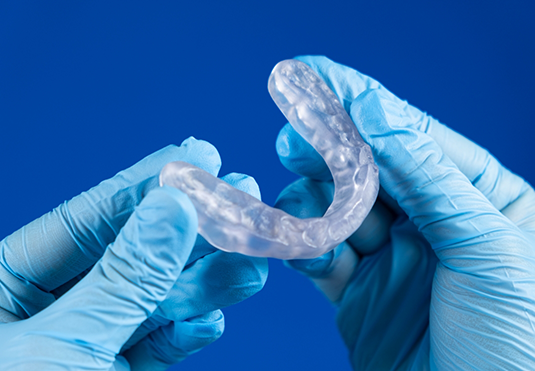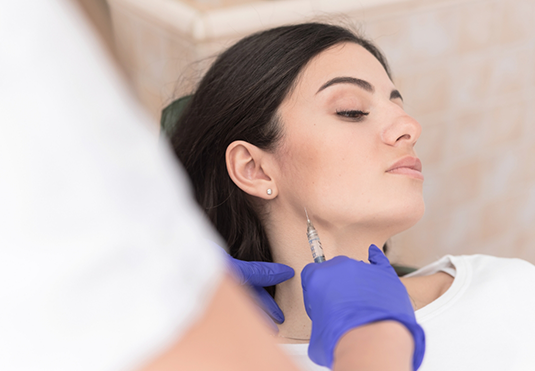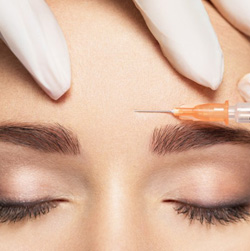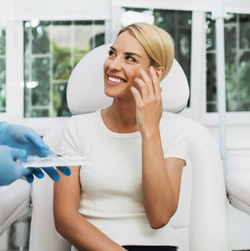TMJ Treatment Mt Pleasant
Relief for Your Aching Jaw

If you have pain in your jaw, don’t just ignore it! You could be dealing with a TMJ disorder – a condition that’ll slowly harm your oral health. That being the case, the best move is to see us for excellent TMJ treatment in Mt. Pleasant. This service would soothe your facial aches, setting you and your smile on the right track. Find out more about it by reading below or by scheduling a visit.
Why Choose Smileworks General & Cosmetic Dentistry for TMJ Treatment?
- Custom Occlusal Splints for Heightened Comfort
- Caring & Knowledgeable Dental Experts
- Beautiful, State-of-the-Art Dental Office
What Is TMJ Disorder?

TMJ refers to your temporomandibular joints – the tiny hinges connecting your jaw to your skull. TMJ disorders are problems with said hinges and the facial muscles that control them.
Most TMJ disorders cause a range of unpleasant symptoms:
- Jaw pain
- Facial pain
- Stiffness in the jaw
- Jaw popping or clicking
- Headaches or migraines
- Pain when chewing or biting
How We Treat TMJ Disorder

Depending on your disorder’s cause, we’ll provide you with an equilibration or an occlusal splint.
An equilibration (or occlusal adjustment) helps when the TMJ has an alignment issue. For this treatment, our dentists slightly reshape a few teeth so the top and bottom arches fit together better. Such changes would reduce the pressure on your TMJ.
If the disorder stems from bruxism or teeth grinding, we’ll give you an occlusal splint. This device reduces muscle tension in your face, lessening the pressure on your jaw joints.
(You’ll only wear the splint at night.)
BOTOX for TMJ Treatment

For patients in need of immediate relief from TMJ-related pain, we can strategically inject Botox into overactive and overworked jaw muscles, making them relax. This effect comes on quickly and will last for months on end, during which our team can apply a more long-term solution so that the problem doesn’t come back.
What is BOTOX?

BOTOX is a diluted form of botulinum toxin – a bacteria known to paralyze the muscles when administered locally. Rest assured, despite its scary-sounding origins, BOTOX is perfectly safe and FDA approved for TMJ management. It has a strong historical record of alleviating muscle tension and as a result, jaw pain.
Are You a Good Candidate for BOTOX for TMJ Treatment?

If you experience any of the following symptoms, BOTOX could very well be a good treatment option for you:
- Lockjaw
- Teeth grinding or clenching
- Muscle tension in your facial muscles
- Headaches or migraines
- Jaw clicking or popping
- Chronic jaw discomfort
- Restricted mouth movement
- Ringing ears
Believe it or not, all of these issues can sometimes result from a TMJ disorder. Since your facial muscles and nerves are closely connected, physical stress in one area can easily impact other regions. It’s also important to note that while BOTOX can offer immediate pain relief, you may need a more long-term solution to permanently solve the problem. Get started on TMJ treatment with our team, and we can help you determine whether you’ll be a good candidate for BOTOX injections.
How Can BOTOX Treat TMJ Disorder?

The paralyzing effects of botulinum toxins can actually be used to your advantage! In its diluted form, this bacterium essentially relaxes your facial muscles and prevents them from becoming tense. Thanks to the resulting lack of physical stress, jaw pain and other TMJ disorder symptoms gradually dissipate. According to one study in particular, this method is so effective that BOTOX was found to improve the symptoms of 90% of patients.
In order to manage your discomfort, our team will have to reapply BOTOX injections every three months. This is why we often recommend combining BOTOX with other TMJ treatments. BOTOX can absolutely help you return to your normal everyday routine, but if we can fix the underlying problem altogether, then we can provide you with more long-term relief!
TMJ Treatment FAQs
Can TMJ Be Cured Permanently?
While discomfort caused by a TMJ disorder may fade away on its own over time, it’s best to visit Smileworks General & Cosmetic Dentistry for TMJ therapy if your symptoms are starting to affect your daily life. Treatments like BOTOX can provide temporary relief, but occlusal splints or adjustments/equilibration can permanently address the root causes of jaw tension, misalignments, and other problems rising from TMJ disorders.
Is BOTOX for TMJ Safe?
BOTOX uses small amounts of botulinum toxin to temporarily paralyze muscles. While this is often used for cosmetic purposes such as preventing the appearance of wrinkles, it can also help hold the jaw in a healthier position that causes less stress to the TMJ. When administered by a qualified professional such as the dentists at Smileworks General & Cosmetic Dentistry, this nonsurgical and minimally invasive treatment is safe. While the risk of complications due to BOTOX treatment is low, side effects may include:
- Redness, soreness, or bruising around the injection site
- Headaches that should subside after forty-eight hours at most
- Mild upset stomach
- Flu-like symptoms or respiratory infections
- Temporary eyelid drooping
How Long Does It Take for an Occlusal Splint to Work?
Occlusal splints that treat TMJ disorders are usually worn while the patient is sleeping, and they may notice that their symptoms begin to fade soon after treatment begins. However, the discomfort will not disappear all at once since it takes time for the components of your temporomandibular joint to be adjusted into healthier and more comfortable positions. After six weeks, most patients will notice significant improvement, but splints usually take between three and six months to fully resolve discomfort. However, each patient is unique, so TMJ treatment may be much longer or shorter for some people.
How Long Does Occlusal Equilibration Take for TMJ?
The time it takes for equilibration (also called occlusal adjustment) to work can vary significantly depending on what changes need to be made. However, most patients report experiencing some relief quite soon after their teeth become more well-aligned. The process usually takes only one, two, or three appointments to adjust the pressure of your bite and relieve the stress imbalances cause to the TMJ. These appointments do not usually take much time.
Do Mouthguards Help TMJ?
Athletic mouthguards protect teeth from injury when the wearer plays sports, but they cannot treat TMJ disorder. However, an occlusal splint is a similar appliance designed to be worn over the teeth, and it can adjust a TMJ patient’s bite to help the muscles in their face and jaw relax. This can also help prevent grinding, which stresses the temporomandibular joint and erodes enamel. However, occlusal splints are not the best option for every TMJ patient, so we also offer occlusal adjustments/equilibration as well as BOTOX treatments.
I Need a Checkup & Cleaning I Am Looking for a Dentist for My Child I am Worried About Gum Disease I Have a Cavity or Broken Tooth I am Missing One or More Teeth I Want to Enhance My Smile I Want a Straighter Smile I am Scared of the Dentist I am Worried About Sleep Apnea I Have a Dental Emergency View Our Services








